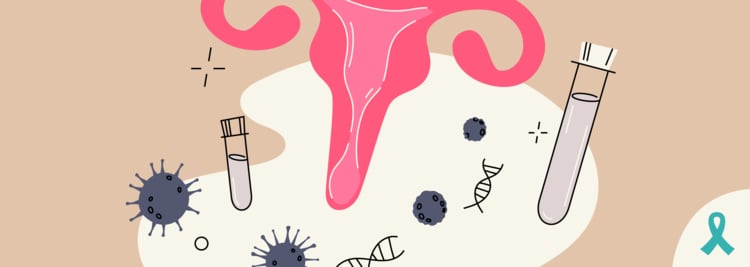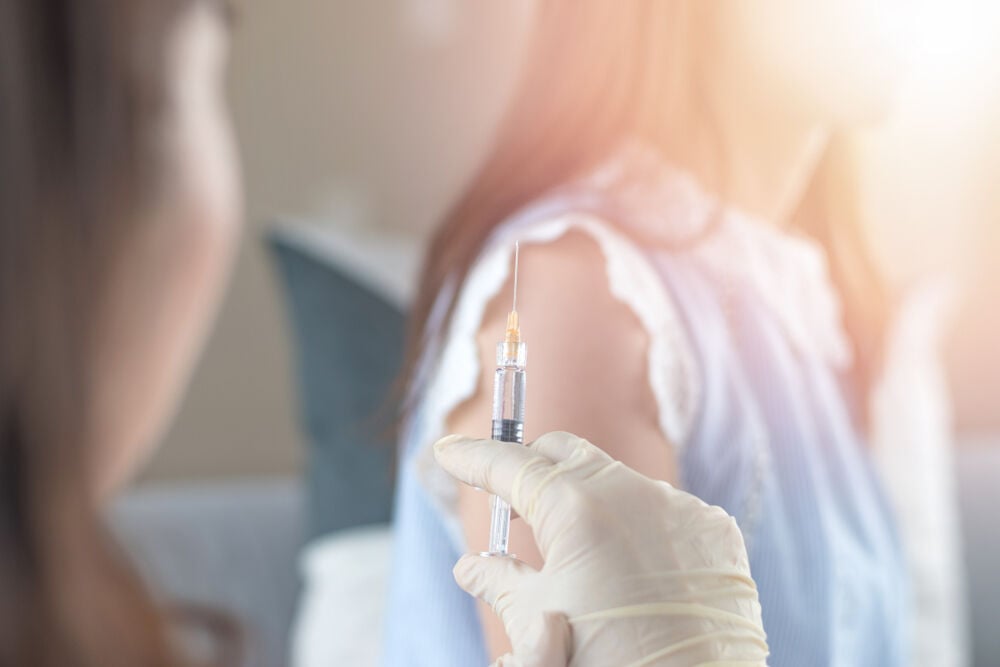Cervical cancer is most often caused by the human papillomavirus (HPV), a sexually transmitted infection (STI). With the help of the HPV vaccine, many cases of cervical cancer can be prevented. Anyone can get the HPV vaccine, and it can prevent cervical cancer if given before exposure to the virus.
-
Tracking cycle
-
Getting pregnant
-
Pregnancy
-
Help Center
-
Flo for Partners
-
Anonymous Mode
-
Flo app reviews
-
Flo Premium New
-
Secret Chats New
-
Symptom Checker New
-
Your cycle
-
Health 360°
-
Getting pregnant
-
Pregnancy
-
Being a mom
-
LGBTQ+
-
Quizzes
-
Ovulation calculator
-
hCG calculator
-
Pregnancy test calculator
-
Menstrual cycle calculator
-
Period calculator
-
Implantation calculator
-
Pregnancy weeks to months calculator
-
Pregnancy due date calculator
-
IVF and FET due date calculator
-
Due date calculator by ultrasound
-
Medical Affairs
-
Science & Research
-
Pass It On Project New
-
Privacy Portal
-
Press Center
-
Flo Accuracy
-
Careers
-
Contact Us
Cervical Cancer Vaccine: Is There One?


Every piece of content at Flo Health adheres to the highest editorial standards for language, style, and medical accuracy. To learn what we do to deliver the best health and lifestyle insights to you, check out our content review principles.
Overview of cervical cancer
Cancer occurs when cells in the body start to grow out of control. Cervical cancer is when cancer cells start in the cervix — the lowest part of the uterus that attaches to the vagina.
The cervix is made up of two different kinds of cells: glandular cells that form the body of the uterus (called the endocervix) and squamous cells that form the bottom part of the cervix (called the exocervix). The place where the two types of cells meet — the transformation zone — is where most cervical cancers begin.
Ordinarily, when women are exposed to the human papillomavirus, their bodies can fight it off. However, in a small percentage of women, the virus stays in the body for years, turning healthy cervical cells into precancerous, and eventually cancerous, cells.
The slow changes to cervical cells can be detected by a Pap test before they turn cancerous. It usually takes several years for precancerous cells to turn cancerous; however, it can also happen in less than a year.
What are the risk factors for cervical cancer?
Anyone with a cervix carries some risk of getting cervical cancer, which is why doctors recommend that women 21 years old and older get regular Pap screen tests every three years. Factors that increase the chances of developing cervical cancer include:
- HPV infection — There are over 150 types of HPV. Only certain strains are considered high risk because of their link to cancer; these include HPV 16, 18, 31, 33, and 45. Repeated infection with these types of HPV can lead to lesions that may progress to cancer.
- Chlamydia infection — Chlamydia is an STI that can cause pelvic inflammation and lead to infertility. There is evidence that women infected with chlamydia have a higher risk of developing cervical cancer.
- Smoking — Smoking exposes people to cancer-causing toxins that can affect all parts of the body, not just the lungs. Smoking doubles your chances of getting cervical cancer and causes damage to the immune system, limiting your ability to fight off HPV infections.
- Weakened immune system — Women with compromised immune systems, such as those with HIV, are at higher risk for HPV infections and may develop cancer more quickly.
- Long-term oral contraceptive use — Research suggests that women who take oral contraceptives for longer than five consecutive years have an increased risk of developing cervical cancer. The risk goes down after oral contraceptive use stops and returns to normal 10 years after stopping.
- Family history of cervical cancer — In some cases, cervical cancer may be hereditary. Women with immediate blood relatives (mother or sister) who have had cervical cancer have a higher risk of developing it themselves.
When should you get an HPV shot?
The HPV vaccine exists to prevent people from getting certain types of HPV infections. The vaccines cannot treat someone once they’ve already been infected. For that reason, the American Cancer Society, the Advisory Committee on Immunization Practices, and the Centers for Disease Control and Prevention recommend routine HPV shots for all children (not just girls) starting at age 11 or 12.
The vaccination series can be started at any time, from age 9 to 26, and in some cases, up to age 47.
The HPV vaccine has not been tested on pregnant women; therefore, it should be delayed until after pregnancy. However, there is no evidence that the vaccine will affect a pregnancy or harm a fetus.
READ MORE: What does HPV look like?

Is the HPV vaccination safe?
HPV vaccines were tested on thousands of people before getting approved. To date, no deaths have been linked to HPV vaccinations.
Side effects of the vaccine may include dizziness, headache, nausea, and fever. People have also reported redness, swelling, and soreness at the injection site.
Talk to your doctor about any allergies you may have before getting the HPV shot. If you are allergic to any of the ingredients in the HPV vaccine, or if you have a severe allergy to yeast, you should not get the HPV shot.
Should a vaccinated person go for cervical cancer screenings?
Every woman should be regularly screened for cervical cancer, whether or not they have been vaccinated. Some types of HPV are not prevented by the HPV vaccine.
The American Cancer Society recommendations for cervical cancer screening are as follows:
- Starting from age 21, all women should have a Pap test every 3 years, until the age of 29.
- Starting from age 30, all women should have a Pap test combined with an HPV test every 5 years. These tests should continue until age 65.
- Alternatively, women can continue to get Pap tests every 3 years until the age of 65.
- Women who are at high risk of developing cervical cancer may need to get tested more often.
A final note about the HPV vaccine
The HPV vaccine can help reduce the number of cervical cancer cases and save lives around the world. Doctors recommend that children get the HPV shot before they are exposed to the virus, thus preventing infection and reducing the risk of spreading HPV or developing cervical cancer later on.
There is no research to suggest that the effectiveness of the vaccine decreases over time. A few shots are all it takes to protect you from dangerous strains of HPV for a lifetime. Your doctor can answer any other questions you have about getting the HPV vaccine.


Hey, I'm Anique
I started using Flo app to track my period and ovulation because we wanted to have a baby.


The Flo app helped me learn about my body and spot ovulation signs during our conception journey.


I vividly
remember the day
that we switched
Flo into
Pregnancy Mode — it was
such a special
moment.
Real stories, real results
Learn how the Flo app became an amazing cheerleader for us on our conception journey.

